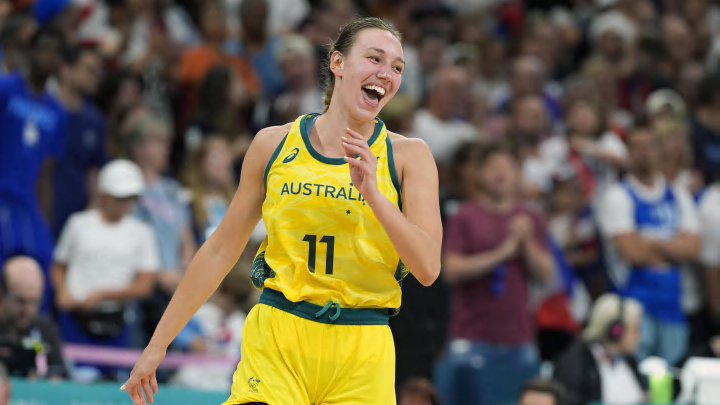Helping guide Australia to its first Olympic medal since 2012, Alanna Smith honored to represent her country

For sixteen years, the Australian women’s basketball team won a medal at every Olympic games, winning bronze medals in 1996 and 2012 with silvers in 2000, 2004 and 2008. But for two straight Olympics, the Opals as they are nicknamed, fell short of their goals, getting eliminated in the quarterfinals in both the 2016 and the 2020 games. However, that all changed this year when Stanford’s very own Alanna Smith helped bring home the team’s first Olympic medal in 12 years.
Coming in second place in their group, the Opals qualified for the knockout stage of the tournament where after beating Serbia, they found themselves playing for a shot at the gold medal game when they earned a place in the semifinals. Despite falling 85-64 to the United States, the medal hopes were kept alive for the Opals as they still wound up playing for the bronze in the third place game, where an 85-81 win over Belgium broke the 12-year Olympic medal drought.
Smith, who plays in the WNBA for the Minnesota Lynx, played a key role for the Opals during the team’s Paris campaign, starting at the power forward position for a majority of the run and averaged 11.5 points per game in six games played, averaging 22.7 minutes per game,. Her best game come against Serbia in the quarters, where she scored 22 points in 28 minutes, while adding 13 rebounds en route to helping the Aussies take home the 85-67 win.
A member of the 2020 Tokyo team, Smith earned her second consecutive Olympic selection after putting together a strong run of performances in the WNBA, where she is currently averaging 11.5 points, 5.4 rebounds and 3.3 assists per game as the Lynx’s starting center in her first season with the franchise. But when it comes to playing for her country in the Olympics, Smith believes that there is no greater honor or privilege, even if it means having to navigate an in-season break from her normal job of being a WNBA superstar.
“It’s a challenge for sure because you’re trying to focus on your everyday which is the WNBA season and we play so many games back-to-back-to-back,” Smith said in a Bally Sports interview with Lynx assistant coach Rebekkah Brunson. “So you have to be focused because one day you’ve got a game and then you’ve got rest the next and then you’ve got another game, like you have to be locked in. But then, you’ve also got this looming event that’s just so important and representing your country is an amazing thing. To be able to do it is such a privilege and you want to be able to perform your best there.”
Smith, who joined the Lynx prior to the start of the season after spending her first three seasons in Phoenix followed by one-season stops in both Indiana and Chicago, was drafted eighth overall by the Mercury in the 2019 draft after a stellar college career at Stanford. In college she averaged 11.9 points, 5.9 rebounds and 1.1 assists across her four years with the Cardinal, including putting together a senior year where she averaged nearly 20 points per game. A key player in Palo Alto in Tara Vanderveer’s system, Smith left Stanford as a legend.
A national team selection can bring about a major sense of pride for whoever gets the call and as Smith continues to make a name for herself on the Opals, she will also not only look to cement herself as the new face of Australian women’s basketball, but continue to grow the game in a country that has seen the game become a major fixture in its culture.
